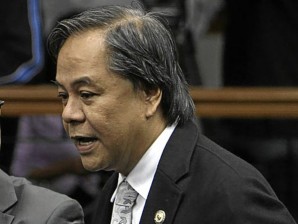Prosecutors drop 2 raps in Article 3 vs Corona

House prosecutor Giorgidi Aggabao said that following Senate President Juan Ponce Enrile’s ruling against Enrique Javier’s testimony, the prosecution would now limit its offer of evidence on this specific accusation to the testimony of Flight Attendants and Stewards Association of the Philippines (Fasap) president Robert Anduiza. INQUIRER FILE PHOTO
Prosecutors on Wednesday dropped two other charges against Chief Justice Renato Corona in the third article of the impeachment complaint a day after Senate President Juan Ponce Enrile rejected a witness called to testify that Corona enjoyed free plane tickets from Philippine Airlines (PAL) while it was pursuing a case in the Supreme Court.
The two charges involved Corona’s alleged “excessive entanglement” with former President Gloria Macapagal-Arroyo following the appointment of his wife Cristina to Camp John Hay Development Corp. and Corona’s purported discussion with Lauro Vizconde of the murder case of Hubert Webb.
Vizconde, whose wife and two daughters were murdered, had gone to Corona to inquire about the case before Webb, son of former Senator Freddie Webb, was acquitted by the high tribunal in December 2010.
Senator Miriam Defensor-Santiago said House prosecutor Giorgidi Aggabao’s announcement on Wednesday afternoon on the two charges was “unconventional,” but not before berating the prosecution panel for insisting that Enrique Javier, PAL vice president for sales, could testify on a charge that was not included in Article 3.
Tactic like in Estrada’s case
Article continues after this advertisementSantiago warned that presentation of evidence not included in an article of impeachment was the same tactic used by prosecutors in the impeachment trial of then President Joseph Estrada in 2001 when they insisted on presenting the contents of the so-called second envelope.
Article continues after this advertisementSenator-judges at that time voted 11-10 to reject the presentation that was supposedly related to charges that Estrada received bribes from “jueteng” (illegal gambling) operators.
Article 3 accuses Corona of culpable violation of the Constitution and betrayal of public trust for failing to meet “stringent standards,” specifically those requiring a member of the judiciary to be “a person of proven competence, integrity, probity and independence.”
Private prosecutor Marlon Manuel would have wanted Javier to testify on Corona’s and his wife Cristina’s frequent round-trip flights using “free plane tickets” provided by PAL.
Prosecutors had planned to show that the perks PAL offered to Corona could be behind the Supreme Court’s decision recalling an order that awarded back wages to dismissed employees of the airline.
‘Unconventional’ move
Aggabao said that following Enrile’s ruling against Javier’s testimony, the prosecution would now limit its offer of evidence on this specific accusation to the testimony of Flight Attendants and Stewards Association of the Philippines (Fasap) president Robert Anduiza.
Senator Francis Escudero, however, was able to clarify during his questioning of Aggabao that the charges against Corona in connection with the Fasap case would be the sole charge in Article 3 and would be voted upon by the senator-judges at the conclusion of the impeachment trial.
Santiago stood up to note that Aggabao’s move was unconventional. “Why were you wasting the time of this court?” she asked.
Aggabao said the prosecution realized the need to “abbreviate” the proceedings, hence the two other charges in Article 3 were dropped.
At the start of the trial, Santiago again fired her guns at unnamed parties who insisted on presenting Javier’s testimony.
Due process
Santiago, a former trial judge, pointed out that the Bill of Rights gave an accused the right to be informed of the specific criminal charges hurled against him.
“That is how the Constitution defines due process… We must inform the accused in a criminal proceeding or in a semi-criminal proceeding such as ours of the nature and cause of the accusation against him. We cannot admit testimony or any other evidence concerning an allegation not included in the complaint or information. In this case, in the articles of impeachment,” she explained.
“There are mindless talkers (biritero) singing a false note, who wonder what is the difference? That’s just another witness, just put him on the stand (isingit na lang ‘yan)! That is violative of the due process clause of the Constitution,” Santiago fumed.
The senator recalled that the same situation surfaced during the Estrada impeachment trial, when prosecutors were adamant about presenting the contents of the second envelope supposed to cement the then President’s ties with jueteng lords.
“I pointed out that unless the prosecution first amended their information (we cannot) open the second envelope,” she recalled.
Santiago said the envelope was eventually opened and there was “nothing incriminatory” in its contents.
Body of technicalities
“It is fatal to a criminal case when rules are not followed, so you must be careful in drafting a complaint. Make sure everything is there. There are many kibitzers who think they are better than those who studied the law! You invoke that this is only a technicality when the law is exactly a body of technicalities,” she said.
Santiago obviously referred to the lead House prosecutor, Niel Tupas Jr., who argued that the noninclusion of bribery, which Javier’s testimony was about, among the charges against Corona was a “technicality.”
Tupas was trying to convince Enrile at that time to accommodate Javier as his testimony would supposedly bolster the charge of betrayal of public trust against the Chief Justice.
“Be careful when you think you know better than a lawyer or a judge. So filled with hubris about ignorance,” Santiago added.
Senator Jose “Jinggoy” Estrada told the Philippine Daily Inquirer in a phone interview that had Enrile allowed the prosecution’s presentation of Javier’s testimony, “it would have been a repeat of what prosecutors did during my father’s trial.”
“Imagine if we had to divide the house again, put the issue to a vote and have consequences beyond our control,” Estrada said. With Tetch Torres, INQUIRER.net
Originally posted at 05:05 pm | Wednesday, February 22, 2012